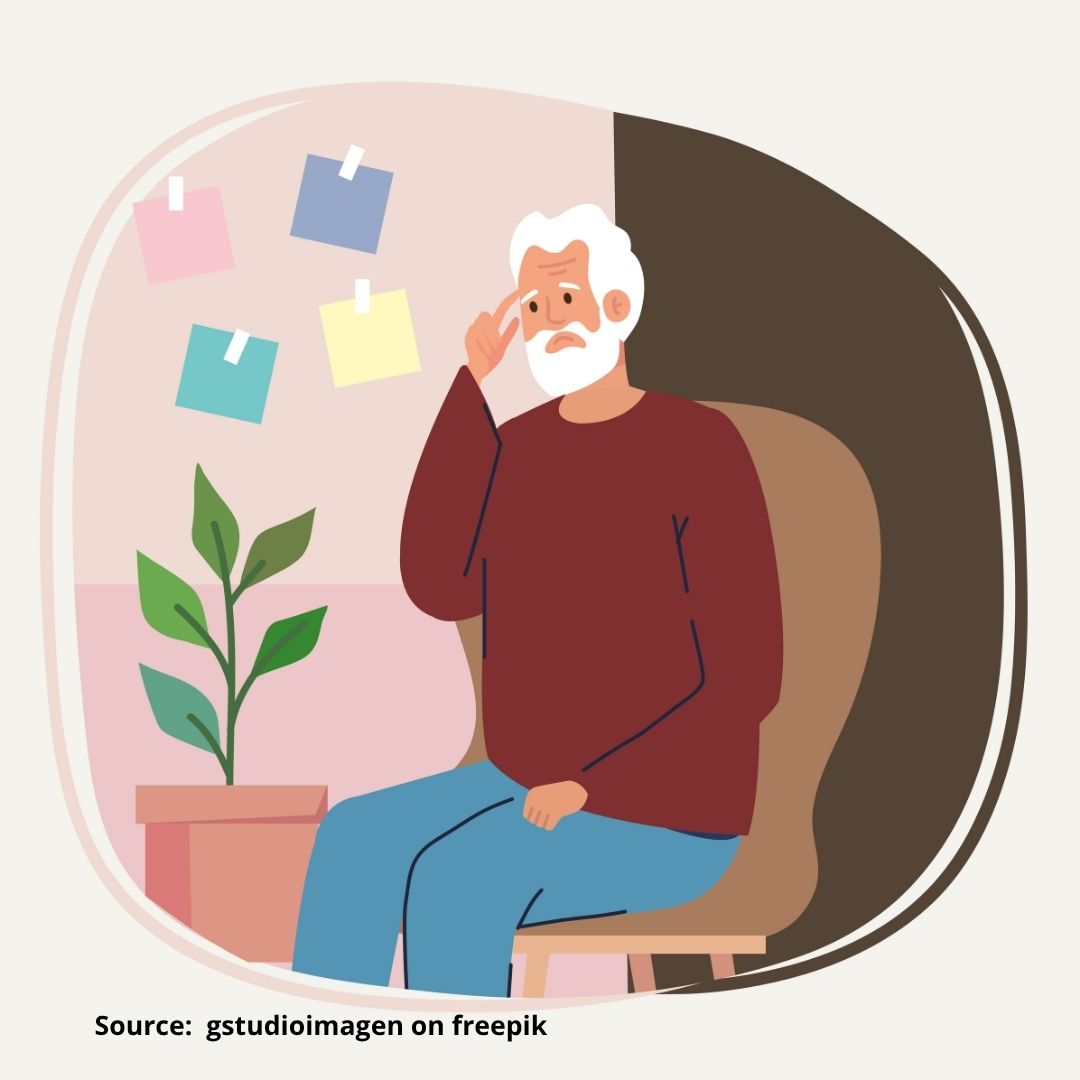ANALYSIS OF RISK FACTORS ASSOCIATED WITH DEPRESSION IN ELDERLY LEPROSY SURVIVORS IN TUBAN REGENCY
Analisis Faktor Risiko Yang Berhubungan Dengan Depresi Pada Lansia Penyintas Kusta di Kabupaten Tuban

Downloads
Background: Leprosy is an infectious disease that has an impact on the physical, socioeconomic, spiritual, and psychological of sufferers with one example being depression. Purpose: This research aims to find the relationship between risk factors and depression in elderly leprosy survivors residing at the Leprosy Rehabilitation Center, Tuban. Methods: The research method used is analytical observational with a cross-sectional approach. The research population consists of 100 leprosy survivors at the Social Rehabilitation Unit for People with Chronic Illnesses, Nganget, Tuban. The total sample of the research is 64 respondents selected from the population using simple random sampling technique. The data analysis technique employed is the Chi-square test. Results: Most of the respondents had level 2 disability as much as 68.80% and as much as 65.50% experienced depression. The research findings indicate a relationship between the variables of gender (p=0.03; PR=1.49; 95% CI=1.00-2.21), level of disability (p=0.00; PR=2.26; 95% CI=1.08-4.71), disease perception (p=0.00; PR=2.05; 95% CI=1.27-3.31), self-stigma (p=0.00; PR=2.00; 95% CI=1.32-3.02), with depression among elderly leprosy survivors. Conclusion: The conclusion indicates that the factors of gender, level of disability, self-stigma, and disease perception have a significant relationship with depression in elderly leprosy survivors, while the factors of age, education level, and caregiver support are not related to depression in elderly leprosy survivors.
Ministry of Health of the Republic of Indonesia. Launching of distance learning training module for leprosy prevention and control. 2020.
Sutrisni E. Indonesia.go.id. 2024. Leprosy in Indonesia: data, facts, and handling steps.
East Java Provincial Health Office. Health profile of East Java Province. 2022 [cited 2024 May 5].
Agustin RA. Literature review of neglected tropical diseases: holistic aspects in leprosy and filariasis patients. J Ilmu Kesehat. 2020 May 8;8(2):138–46.
Hannan M, Hidayat S, Nirmala Sandi M. Community stigma towards leprosy sufferers in Batuputih District, Sumenep. Wiraraja Med J Kesehat. 2021 Dec 27;11(2):86–92.
Li D, Su M, Guo X, Liu B, Zhang T. The association between chronic disease and depression in middle-aged and elderly people: The moderating effect of health insurance and health service quality. Front Public Heal. 2023 Jan 24;11:01–14.
Niardhy ALP, Prakoeswa FRS, Dewi LM, Herawati E. The association of stigma with the incidence of depression in leprosy patients: a systematic review. J Kedokt Syiah Kuala. 2024 Jan 3;23(3):377–83.
Govindasamy K, Jacob I, Solomon RM, Darlong J. Burden of depression and anxiety among leprosy affected and associated factors—a cross sectional study from India. PLoS Negl Trop Dis. 2021;15(1):e0009030.
Prakoeswa F, Prakoeswa AC, Prakoeswa CA, Listiawan MY, Endaryanto A, Prakoeswa CRS. Immune profile (Th1, Th2, Th17, T-reg) of maternal-paediatrics population in leprosy endemic areas in East Java, Indonesia: a cross-sectional study. 2022;
Najmuddin M. Stigma towards leprosy: a review of interpersonal communication. Al-Din J Dakwah dan Sos Keagamaan. 2022;8(1):70–83.
Bhandari J, Awais M, Robbins BA, Gupta V. Leprosy. StatPearls Publishing; 2023.
Amaliah H. R. R, Yuniati L, Roem NR, Vitayani S, Setiawati S. Characteristics of leprosy patients undergoing outpatient treatment at the Tamalate Makassar Health Center for the period 2018–2021. Fakumi Med J J Mhs Kedokt. 2023 Jul 16;3(5):357–65.
Abdul Rahman N, Rajaratnam V, Burchell GL, Peters RMH, Zweekhorst MBM. Experiences of living with leprosy: A systematic review and qualitative evidence synthesis. PLoS Negl Trop Dis. 2022;16(10):e0010761.
Dirgantini T, Lidia K, Trisno I, Buntoro IF. The relationship between the length of time suffering from Morbus Hansen and the level of depression in patients at the Naob Leprosy Rehabilitation Center, North Central Timor Regency. J Kesehat Masy. 2022;10(4):405–10.
Mangeard-Lourme J, de Arquer GR, Parasa J, Singh RK, Satle N, Mamhidi R. Depression and anxiety in people affected by leprosy and lymphatic filariasis: a cross-sectional study in four states in India. Lepr Rev. 2020;91(4):367–82.
Septianawati P, Mustikawati IF, Kusuma IR, Maulana AM. Characteristics of the Elderly and the Incidence of Depression at the Sodagaran Banyumas Elderly Social Services Center (PPSLU). Muhammadiyah J Geriatr. 2022 Dec 31;3(2):36.
Shi P, Yang A, Zhao Q, Chen Z, Ren X, Dai Q. A hypothesis of gender differences in self-reporting symptom of depression: implications to solve under-diagnosis and under-treatment of depression in males. Front psychiatry. 2021;12:589687.
Jufriyanto M, Yusuf A, Mundakir M. The psychosocial experiences in ex-Leprosy patients: a qualitative study. Str J Ilm Kesehat. 2020;9(2):733–42.
Manafe LA, Berhimpon I. The relationship between the level of depression in the elderly and social interaction in the elderly at BPSLUT Senja Cerah Manado. J Ilm Hosp. 2022;11(1):749–58.
Muharrom M, Damaiyanti M. Relationship between age, gender, physical activity and depression in the elderly in Samarinda. Borneo Stud Res. 2020;1(3):1359–64.
Listiyorini MW, Sahar J, Nurviyandari D. Internal and external factors related to depression in the elderly at the Tresna Werdha Budi Dharma Bekasi social home. Malahayati Nurs J. 2022 Oct 13;4(10):2708–28.
Jansson M, Gatz M, Berg S, Johansson B, Malmberg B, McClearn GE, et al. Association between depressed mood in the elderly and a 5‐HTR2A gene variant. Am J Med Genet Part B Neuropsychiatr Genet. 2003;120(1):79–84.
van Dorst MMAR, van Netten WJ, Waltz MM, Pandey BD, Choudhary R, van Brakel WH. Depression and mental wellbeing in people affected by leprosy in southern Nepal. Glob Health Action. 2020;13(1):1815275.
Joannès C, Redmond NM, Kelly-Irving M, Klinkenberg J, Guillemot C, Sordes F, et al. The level of education is associated with an anxiety-depressive state among men and women–findings from France during the first quarter of the COVID-19 pandemic. BMC Public Health. 2023;23(1):1405.
Ali O, Deribe K, Semrau M, Mengiste A, Kinfe M, Tesfaye A, et al. A cross-sectional study to evaluate depression and quality of life among patients with lymphoedema due to podoconiosis, lymphatic filariasis and leprosy. Trans R Soc Trop Med Hyg. 2020;114(12):983–94.
Batubara DE, Nuralita NS. The relationship between the grade of disability and the degree of depression in leprosy patients in SiCanang, Belawan, North Sumatra. Bul Farmatera. 2022;7(1):39.
Lufianti A, Mahanani S, Idris DNT. Stigma and Self-concept of leprosy patients. Open Access Maced J Med Sci. 2022;10(G):300–5.
Bagaskara V, Susilowati E. Pormation of self stigma of people with hiv/aids fostered by social institution lensa sukabumi. J Ilm Rehabil Sos. 2022;4(1):12–22.
Lew SQ, Centron P. Psychiatric challenges in patients treated with peritoneal dialysis. In: Psychosocial aspects of chronic kidney disease. Elsevier; 2021. p. 311–33.
Stafford L, Berk M, Jackson HJ. Are illness perceptions about coronary artery disease predictive of depression and quality of life outcomes? J Psychosom Res. 2009 Mar;66(3):211–20.
- Every manuscript submitted to must observe the policy and terms set by the Jurnal Berkala Epidemiologi
- Publication rights to manuscript content published by the Jurnal Berkala Epidemiologi is owned by the journal with the consent and approval of the author(s) concerned. (download copyright agreement)
- Complete texts of electronically published manuscripts can be accessed free of charge if used for educational and research purposes according to copyright regulations.

JBE by Universitas Airlangga is licensed under a Creative Commons Attribution-ShareAlike 4.0 International License.























